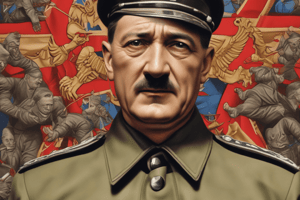Podcast
Questions and Answers
When out of prison, Hitler expanded the ______ Party in Germany
When out of prison, Hitler expanded the ______ Party in Germany
Nazi
By 1929, the Nazi Party had a national ______ organization
By 1929, the Nazi Party had a national ______ organization
party
Unemployment had risen dramatically, growing from 4.35 million in 1931 to about ______ million by the winter of 1932
Unemployment had risen dramatically, growing from 4.35 million in 1931 to about ______ million by the winter of 1932
5.5
The Nazis quickly brought all ______ under their control
The Nazis quickly brought all ______ under their control
They set up prison camps called ______ camps for people who opposed them
They set up prison camps called ______ camps for people who opposed them
Flashcards are hidden until you start studying
Study Notes
Hitler's Early Life and Ideology
- Adolf Hitler was born in Austria in 1889
- He failed in school and traveled to Vienna to become an artist but was rejected by the academy
- He developed his basic political ideas in Vienna, with racism and anti-Semitism at the core
- He was an extreme nationalist who believed in the effective use of propaganda and terror
Rise of the Nazi Party
- Hitler joined the German Workers' Party in 1919, which was later renamed the National Socialist German Workers' Party (NSDAP) or Nazi
- By 1921, he had taken total control of the party
- The party had 55,000 members and 15,000 in the party militia, known as the SA, Storm Troops, or Brownshirts, by 1923
- Hitler staged an armed uprising against the government in Munich in November 1923, known as the Beer Hall Putsch, but was quickly crushed and sentenced to prison
- In prison, he wrote Mein Kampf, which linked extreme German nationalism, anti-Semitism, and anticommunism with a Social Darwinian theory of struggle
Mein Kampf and Nazi Ideology
- Mein Kampf emphasized the right of "superior" nations to Lebensraum ("living space") through expansion
- It also upheld the right of "superior" individuals to gain authoritarian leadership over the masses
Rise of Nazism
- Hitler realized that the Nazis would have to attain power legally, not by violent overthrow, after his failed uprising
- By 1929, the Nazi Party had a national party organization and had become the largest party in the Reichstag by 1932
- Germany's economic difficulties, including rising unemployment, contributed to the Nazi rise to power
- Hitler promised a new Germany that appealed to nationalism and militarism
The Nazis Take Control
- After 1930, the German government ruled by decree with the support of President Hindenburg
- The right-wing elites of Germany looked to Hitler for leadership, and he became chancellor in 1933
- The Enabling Act of 1933 gave the government the power to ignore the constitution for four years, effectively making Hitler a dictator
- The Nazis quickly brought all institutions under their control, purged the civil service of democratic elements and Jews, and set up concentration camps for opponents
- By the end of the summer of 1933, Hitler had established the basis for a totalitarian state
Studying That Suits You
Use AI to generate personalized quizzes and flashcards to suit your learning preferences.




